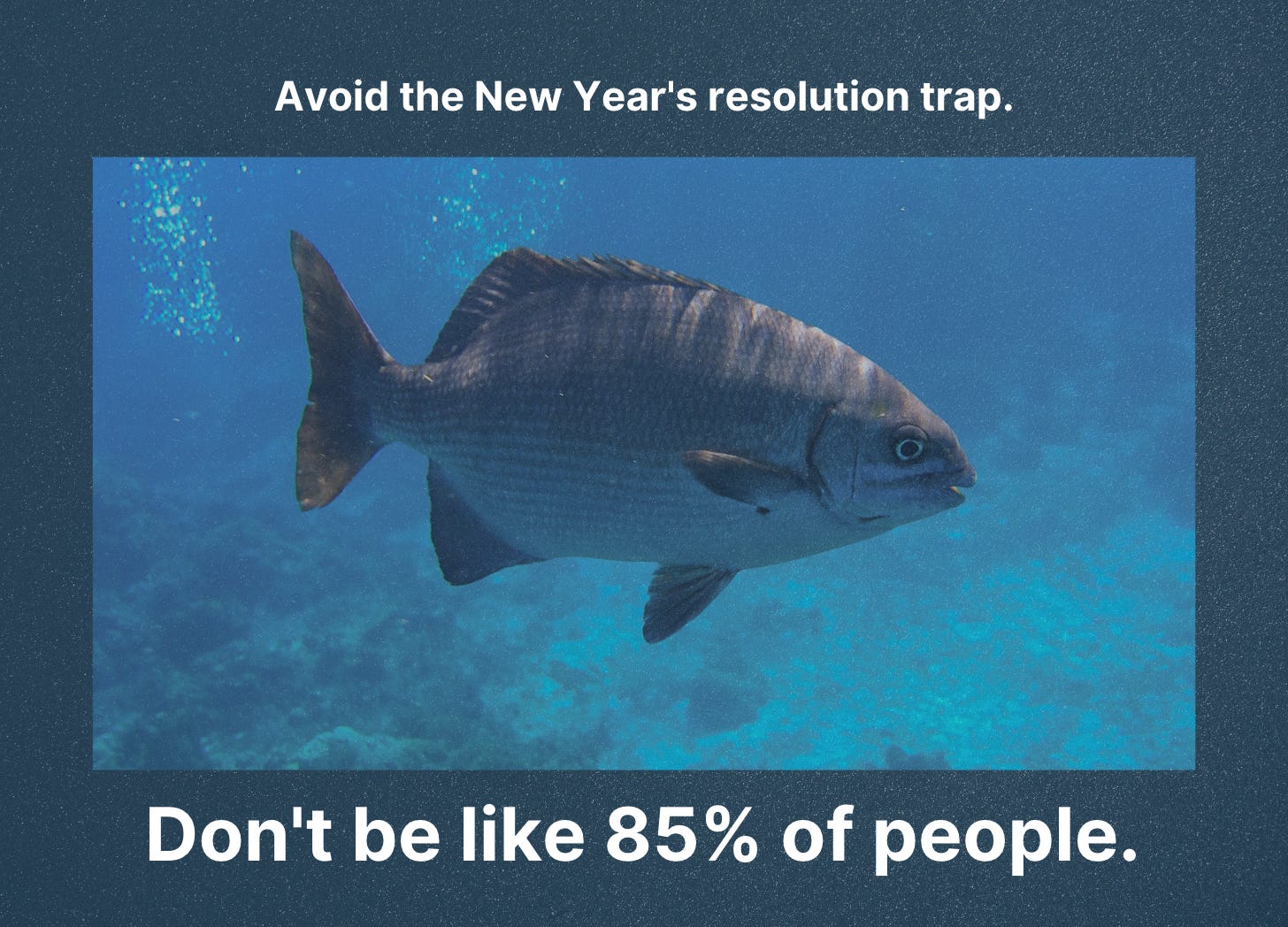As humans we overestimate our ability to control something, on a spectacular level.
We’ve been raised with this idea that with brain power and ‘mind skills’, we can control the outcomes of things we set out to achieve.
When you believe you can control something, I’m sorry, you’re off the mark.
Here’s why. And later in this newsletter, you’ll learn how to set habits that actually last.
Think of your own intentions for the moment.
How many times have you set a New Year’s resolutions in your lifetime (or any goal for that matter)?
Of those resolutions, how many did you stick to and embed in your everyday life beyond 12 months? 1, 2, 5, 10? Or zero?
If you’re like 85% of the population, you didn’t stick to them.
Most people who set New Year’s resolutions actually give up within the first 3 months.
And there’s actually a very good reason for this. It’s the illusion in the illusion of control.
The illusion gives us a sense of hope. It gives us something to strive for. It gets us out of bed. It motivate us to want to change.
But remember, an illusion is a false idea. It’s a deception into making you believe that (control) is possible.
Unfortunately, our mind is a sucker for deception. One deception is the belief that ‘motivation’ is the answer to achieving our New Year’s resolutions. In other words, if you use enough willpower, you can achieve anything you put your focus on.
Except, motivation in itself is an illusion. Motivation is a feeling. A feeling is a chemical sensation in the body. Feelings change moment to moment, minute by minute.
We wake up one day and feel ready to get fit and healthy. We head out for a run, buy healthy food, and all the gym gear. We wake up the next day, we don’t feel motivated, and avoid the run.
We feel inspired watching a video of a leader talking about leading with courage. It inspires to finally start having those honest conversations with colleagues we’ve always wanted to have. The next day, the conversation feels too scary. We make an excuse and avoid the conversation.
We witness someone in the community showing kindness to the homelessness. We feel a sense of compassion and make a promise to start buying homeless people food as we pass by. We walk by the next day, you feel too rushed to make the effort, and walk on by.
And here’s the thing with New Years resolutions. They will go well for you in the first few days and months. You will have enough energy/willpower from the initial feel good factor of change to keep going.
But then the feeling dwindles. It starts to feel hard. You start to question whether it was the right goal. You ruminate on whether it is the right ‘plan’.
Your sense of control has gone because the battery of willpower has run out.
Except, until next time.
It’s a cycle of despair and most disappointing, you beat yourself up. You’re not to blame and you’re not alone.
To be frank, setting New Year’s resolutions are not good or bad. I don’t have an opinion on whether you should have them or not. I’d be more interest in how you set up your mindset and systems around it that matters more.
We should think like a fish, according to Leo Babauta.
Consider the fish. A fish swims in a chaotic sea that it cannot possibly control — much as we all do. The fish, unlike us, is under no illusion that it controls the sea, or other fish in the sea. The fish doesn’t even try to control where it ends up — it just swims, either going with the flow or dealing with the flow as it comes. It eats, and hides, and mates, but does not try to control a thing. So too, should we hold our lives.
In other words, let go of control of your thoughts, feelings and emotions. Be like a fish.
Don’t rush into instant gratification. Sit with the feeling, be present in the moment, let the feeling pass, try not to get caught up in the future.
If you’re intending to address some behaviours you dislike in 2023, here’s how do you do it in a way that’s healthy and likely to create lasting habits:
Don’t set big goals, choose one behaviour that aligns with who you want to be.
Don’t wait to feel ready, just do it when regardless of how you feel.
Don’t do what you dislike, choose what you enjoy.
Don’t judge others, instead try to support them.
Don’t expect the ride to be easy, reset quickly when you fall off the wagon.
Don’t run too fast out the blocks, take one step at a time.
Don’t believe the illusion that the destination will make you happy, enjoy the journey.
Don’t do it in 2023, do it now.
When you experience that thought, “I’m finally going to change”, recognise it’s a normal reaction. But most importantly, don’t listen to it. Instead, notice it, accept it, and remind yourself, control is an illusion.
Comments are always open for comments and questions.
Check out my top 5 performing newsletter here:
Dean.



